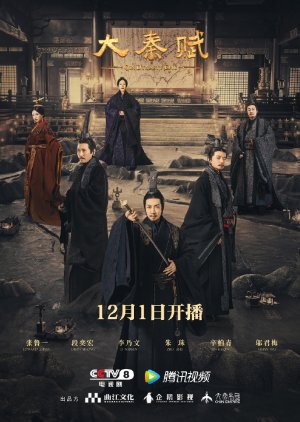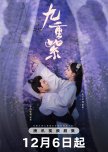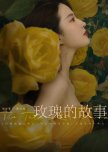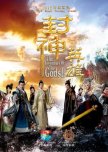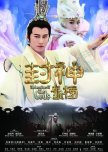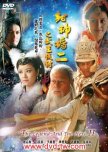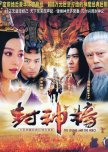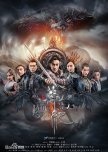
When you play the game of thrones, you win or you die.
Qin Dynasty Epic, the fourth and final installment of the highly regarded Qin Dynasty series, is about how Yin Zheng fulfilled "Heaven's Mandate" to unify the Warring States (475-221 BC) and became the first emperor of China at age 38 in 221 BC. Such a monumental task was not achieved without the vision and dedication of many great talents from brilliant tacticians, crafty spies, talented engineers and powerful generals. These characters that made it all possible and how they were pitted against wily and determined opponents from six rival kingdoms is magnificently and vividly brought to life in this stunning production.The production values are very high and there is extraordinary, game of thrones worthy battle footage against some truly breathless backdrops that convey the epic vastness and splendor of the empire. In-depth research and meticulous attention to detail are evident in the costumes, the weapons, the sets and the authentic portrayal of military strategies, diplomacy, espionage, the economics of funding prolonged warfare, the evolution of a common script, immigration and the consequent racial frictions and the conflict between meritocracy and legacy. These themes are seamlessly woven into the visual storytelling in a way that you cannot miss the natural, impenetrable mountain fortress that is Hangu Pass and the Qin life size battle map that further reinforces the topological and geographical advantages of the Qin state.
This is a historical drama but if you are not familiar with Qin history, then be warned that there are mild spoilers in the paragraphs ahead.
Duan Yihong's delicious portrayal of Lv Buwei, venal merchant turned kingmaker and indisputably one of history's great adventurers anchors well over half the drama. His economic reforms and policies paved the way for the eventual unification of the Warring States well before Ying Zheng's conquests began. This is the best written and best acted role in the drama that literally steals the show. This wonderfully grey character that was so inspired by a vision bigger than himself that he actively recruited and promoted the best talent even against his own nature and interest, notably in the case of Li Si. Their scheming both as rivals and allies and mutual respect despite their differences is one of the most complex and riveting portrayals in this drama. I find Li Si the character insufferable and while Li Naiwen's acting is good, it is not quite on par with that of Duan Yihong. Even though I think the drama ends at the right place, it is a pity we don't get to see the irony that Li Si whose life work was Qin's unification may have brought about Qin's rapid downfall with his cruel interference in Ying Zheng's succession. I love that this drama properly credits both Lv Buwei and Li Si with many of the lasting reforms made during Ying Zheng's reign; indeed many (not all) were well underway while he was still a powerless boy king.
The most slanderous and malicious accusation in Sima Qian's Shiji (史记 or Records of the Grand Historian) is that Ying Zheng was in fact Lv Buwei's son; that his former concubine Zhao Ji was already pregnant when she married Ying Yiren. Current historians are rightly skeptical as that would have been a 12 month pregnancy but the drama raises the question head on and leaves room for viewers to decide for themselves. It is likely no accident however, that they cast two actors that bear a strong resemblance to each other as Ying Yiren and Ying Zheng; both in terms of stature and elongated, elegant facial features and in sharp contrast to both Zhao Ji and Lv Buwei's more common rounded features. The desire to put both actors side by side results in the drama's biggest judgement error of having a 40 year old man play the 13-year old Ying Zheng. This is a tall ask of any actor and Zhang Luyi did the best he could but it isn't until well over halfway through the drama that the character's age catches up with that of the actor. In a misguided attempt to make Ying Zheng more relatable, we suffer through some unfathomable cringe dialogues as the obviously middle aged Zhang Luyi plays an adolescent Ying Zheng who is bullied, questions his legitimacy, experiences infatuation and grapples with his mommy issues.
In an attempt to appeal to broad audiences, the drama over-indulges in the salacious Lao Ai/Zhao Ji arc. Zhao Ji is mercilessly portrayed as the wanton, shallow, selfish, reckless and easily manipulated harlot who likely turned Ying Zheng into a misogynist whose women were all anonymous. And while Lao Ai's allegedly majestic physical attributes can never be disproven, he definitely had a peanut sized brain and his attempted coup was puny and nowhere near the scale the drama suggests. Although scandal holds timeless appeal, I am here to watch the first emperor of China, not the first gigolo of China. The time would have been better spent building up characters who become prominent after Lv Buwei's exit and indeed the immediate next 1-2 episodes feel like one hand clapping.
I must mention that Zhang Lu Yi redeems himself with his characterization of the mature Ying Zheng. I was riveted by how he howled like his heart was torn from him when he "fulfilled" Zhao Yan's abominable request only to be overcome with remorse and cowardice when faced with the real thing years later. His portrayal of Ying Zheng's encounter with Jing Ke is also exceptional. That said, I have mixed feelings about how this larger than life figure was written, it somewhat diminishes him. While I like that they humanized him and gave him a benevolent side that is at odds with countless other depictions, I wish they went with a bolder, more controversial interpretation by balancing that out with some vices and a more ruthless, darker side as well. I didn't need to see him cook scholars but even how he dealt with Lao Ai's kids was just glossed over, not to mention his legendary harem and his intense superstition. The real Ying Zheng is probably turning in his undisturbed tomb at this millenial, tree hugging, touchy feely characterization that robs him of the requisite ruthlessness to do great and hard things.
While there are many epic battle scenes the unification wars were fought just as much behind the scenes as on the front lines as all warfare is based on deception. By the time Yin Zheng took over, the six kingdoms appeared to be largely sitting ducks but nonetheless, they put up a really good fight. While the conquest of the remaining kingdoms after Zhao (especially Chu) feels a bit rushed, all the important moments are there. I really felt for the vanquished in this show, was moved by their desperate causes and teared up at their inevitable defeats. The sense of loss experienced by the de-throned young Zhao king with his mother and uncle as regent could have well have been the young Ying Zheng. Under resourced, out smarted, undermined by their own and with the odds against them, Li Mu, Prince Fei and Prince Dan still fought bravely and valiantly. But when you play the game of thrones, you win or you die.
One of my favourite Cantonese expressions is 七国咁乱 which roughly means as chaotic as the warring states. I always find making sense of that messy, turbulent period of Chinese history so mind boggling that I cannot praise enough the clean, smart way this drama's narrative navigates the multitude of important events and characters that lead to the unification of China under Qin and the reforms and contributions that lasted thousands of years. Yes, there are some flaws, some missed opportunities and digressions that do not detract much from this sumptuous and enveloping historical drama that makes this a very solid 9.0 for me.
Esta resenha foi útil para você?

History enthusiasts should not miss this
As the old adage goes, save the best for last. How appropriate, as this is the final drama that I’ve completed before 2020 draws to a close. Personally for me, I consider Qin Dynasty Epic as the best historical non-fiction C-drama production of the year. Aside from being extremely well made, there is simply no other similar non-fiction historical produced this year capable of competing with this drama. Hopefully this brief review provides potential viewers a general idea of what to expect.This is a big budget production and it really shows. The high quality cinematic colour grading, exceptional cinematography and camerawork, elaborately constructed sets, lavish costumes, well-executed action choreography and battle scenes, as well as beautiful vast landscapes, among various other aspects. Principal photography took place at Hengdian World Studio along with gorgeous locales such as Nalati, Sailimu Lake, Changji, Wuerhe, Xiangshan, Duyun, and Xianju. It had been reported in Chinese entertainment news outlets that over 11,000 sets of costumes as well as 4,000 sets of armour were produced for this show alone. Everything looks visually stunning on a very grand scale.
This drama, the fourth and final series in the Qin Dynasty franchise, chronicles the humble beginnings of Qin Shi Huang, the first emperor of China, up to the point of unification and establishment of the first imperial dynasty of China, the Qin Dynasty (around 259 BC to 221 BC). The plot follows very closely the Records of the Grand Historian, written by Sima Qian, as I understand from more knowledgeable viewers on the subject matter. How certain events truly transpired, no one will ever know. But, at the very least, the major events recorded are generally covered, with some degree of dramatization as expected of a drama. It’s worth mentioning here that unlike the first 3 series which are based on the novel, The Qin Empire by author Sun Haohui, critics noted that the script for this latest instalment is not adapted from the novel.
The performance of the ensemble cast is nothing short of remarkable. Aside from Zhu Zhu, whom I’ve come across in American productions, I’ve never seen the rest of the main cast previously but their acting in this drama is testament to their immense talent indeed. The trio of Zhang Lu Yi, Duan Yi Hong, and Li Nai Wen are outstanding in their portrayal of the central characters of Ying Zheng, Lv Bu Wei and Li Si. For me, those three actors carried the entire show. In particular, Duan Yi Hong’s unique version of the complex character Lv Bu Wei deserves much praise. The huge supporting cast, especially the veterans, also deliver an impressive depiction of their respective characters.
The screenplay involving the numerous convoluted political power plays and complicated stratagems used in court machinations and on the battlefields is very cleverly written and deftly executed throughout the entire show. Nothing is ever as it seems and no character is above the use of tactical maneuverings to gain any sort of advantage.
However, the drama is not without flaws, the major issue being the casting of a 40-year old man as a 13-year old boy. I don’t think I need to elaborate more here. For a big budget production, this falls short of the required standard and therefore, a deduction of points for this glaring error of judgment.
In addition to that, certain dramatization of major events, particularly the story arc concerning the infamous pseudo-eunuch and the Queen Dowager, lasts longer than is perhaps necessary. As a result, other more meaningful historical events are not fully fleshed out or shown in greater detail.
Although 78 episodes represent a massive investment of viewing hours, Qin Dynasty Epic presents an utterly compelling insight and in-depth exploration into the origins of China's first imperial dynasty and the long and arduous journey to unification of the many splintered ancient kingdoms and vassal states. For enthusiasts of history, particularly ancient Chinese history, this is an opportunity not to be missed. Being the final installment of the highly successful Qin Dynasty franchise which started back in 2009, it might be a very long while before another epic historical production based on the warring states era gets commissioned, if ever again.
Esta resenha foi útil para você?

Esta resenha pode conter spoilers
Why I end up being disappointed with this epic
Qin Dynasty Epic used to be called Qin Empire 4, I watched the previous three installments last year, they were about previous kings/duke of Qin, all building up to this installment's Ying Zheng unification and start of 2000 years of Imperial China. I'm not overly familiar with Ying Zheng, but he's too well known and has too many achievements for this to not be epic, but I came away rather disappointed. (spoilers reference historical events)First of all, the drama focused on the wrong bits and have terrible pacing issue. Ying Zheng died at 49, most of the common achievements people think of are unification at 38 and what comes after it. He had a fairly interesting childhood and rough start, so I totally understand giving fair amount of attention to that. I'm perfectly willing watch him grow from ascending to the throne at 13 to gaining control of court at 22, clearing obstacles and finding awesome generals and ministers before starting to conquer other kingdoms. Hell, aside from setting up prefecture system, standarising writing system, linking great walls and building roads for carts, his life after unification could have been neat too, he defended Qin against Huns, conquered Bai Yue (modern southern China), and did bunch of things to ensure his reform stayed. Not to mention there's the whole elixir for immortality, didn't name a successor that resulted in Qin's early demise.
The drama covers up to unification so 78 ep over 38 years, which I somewhat understand, since it's more positive ending then setting up for tragedy. It spent 13 ep on first 13 years of his life, bit longer than what I expected but hey it's a long drama, and then 9 ep on last 9 years. These are IMO the best parts of the drama, not just due to pacing but also acting and writing were the best. I'm happy to note that the drama bought up some of the reform fairly early in the drama, and it's sprinkled here and there, so it's not just battles and unification. But these last 9 ep should have been the focus of the drama, I understand that battle scenes are expensive, you could have given me more time to battle strategies? Or other kingdoms' internal issues? Like Chu Kingdom, it lasted less than 2 ep!
Ep 22 to 60 covers him from 18 till 22, that's roughly 10 ep per year, is that really necessary, drama? There's two major events that I expected (from wiki'ing Ying Zheng when I saw him ascend the throne), one lasted 3 ep (bit longer than I expected but reasonable pacing for this story), one lasted 15 ep! There were number of episodes used to set up Zhao as a major opponent, which I don't mind as they were historically rather strong and formidable at the time (featuring two well known generals of Warring States, the other two are Qin's), but I do feel it could have been shorter, or again maybe other kingdoms could have used some focus too? Other episodes feature one major battle and two minor battles, and couple small notable events. Zhengguo Canal was a marvel at the time, but we never saw other big construction projects either, like mausoleum or the roads mentioned in later parts of the drama? The way the drama is paced, the ending arc where the meat of the story should be just feel really rushed. If you slash the middle by half, the pacing would feel much more balanced.
Secondly, the drama's writing was all over the place. Some of the dialogue swere classical Chinese, some of it were fairly plain modern Chinese, which is fine. What's not fine is certain word choices, why does the drama start with what sound like a translation of a western king's speech? What was with that conversation between Ying Zheng and Lv Buwei at ep 12 (?), they make me question if I'm watching a historical epic or a fluffy romcom? To get across the shock, hurt, and confusion, there could have been a lot of other ways, in fact if you just delete some sentences, I wouldn't be all "wtf???" Not exactly word choice, but how the scene was shot, what was with the assassin scene? Okay he got his hair cut to show it was dangerous, but why was he rolling on the floor? What were the other people doing? Why was he fighting like a samurai, it seriously looked super kendo-y? Director, did you just watch the 1998 movie and used that as inspiration and called it a day instead of using historical records?
A big part of the drama was humanising Ying Zheng, as his image to average person is a tyrant. That might have partially been due to Han's Sima Qian's "Record of Historian" demonising him and Qin, since Han is Confucius while Qin is Legalist and dynasty they overthrew, not to mention Qin probably overdid it when it was reforming. That said, I'm constantly confused by the drama being bizarrely in love with "pls love me one more time" narrative, I guess because he had troubled childhood, it make sense and it plays up the tragedy? I found it rather awkward though and it was used way too many times for my taste. The drama was also very intent on selling him as a benevolent king, and it feels super wrong to me. It's fine to have him want to conquer the other kingdoms AND also help some common people he might have met, but why does every decision where he has to kill someone, it's always like he's forced to? He's an emperor, I'm sure they sacrifice some things for their goals, and I'm sure there's some calculated moves, that would made this more interesting. Even with all his flaws (even including tyranny + elixir) , it doesn't diminish any of his achievements.
I had a lot of fun celebrating amazing relationship between previous kings and their ministers because they shared common goals and overcame obstacles together. Ying Yiren and Lv Buwei sort of have that, but there were too little time for it. Lv Buwei became a reluctant antagonist at some point due to circumstances, but Li Si didn't fill his gap as he should have. In fact, Lv Buwei was the most interesting character of the drama, and I could see his love for Qin and I bought everything he does is for mighty goals. Li Si on the other hand, tend to be all talk and not much action, or what little he does seems to end up with a huge mess, e.g. Lao Ai. The writer's plotting simply isn't as awesome as they seem to think, and they really spent way too much time where every single person seem to think unification was totally sure-in and shout it at every chance they have, that's not the case!
Thirdly, our protagonist is completely miscast. I know casting Ying Zheng is real difficult, there's lot of expectation. He did so much when he was young but your average 20-something probably can't hold down such an epic drama and act reasonably well against so many veteran actors. I also know that dramas try to have main lead come out early, but if Han Wu Emperor's Chen Baoguo can come out at ep 22 (out of 58) and leave a classic epic behind, so can you! Casting 40 year old is totally expected, though I would have preferred 30 year old since aging makeup is easier than deaging someone. I can handle 40 playing 20, but you can't possibly convince me they are 13, especially when your actor look older than their age! Couple with some plot points that only make sense if he's super young, he constantly pulls me out of the drama. What's wrong with having him appear in ep 20 or 22 out of 78? You know what, your drama ends before Ying Zheng even catch up to Zhang Luyi's age!
I've been a casual fan of Zhang Luyi since I watched his slow burn republican drama The Red. He fit that role perfectly, he even had a tinge of Shanghaiese accent despite not being one, (it's fairly rare for accents or dialects to appear in cdramas!) Oof this role though, he really really doesn't look like an emperor, ok? He didn't look like one playing Li Longji in Legend of Demon Cat, and he doesn't look like one here. He doesn't always hold himself straight and seem to lean forward at times, it's very apparent when he meets up with Zhao Yan, who looks real regal next to him. The winter costume piled onto him also made his neck disappear, and couple with his posture, it's....not pretty. He tends to yell a lot during intense scenes too, it's not that he can't yell, but he doesn't have that powerful volume? powerful aura that I expect him to have, sometimes I think the scenes would have been more effective if he was quieter. e.g. there was an intense scenes with him and two kids, he looked dangerous and it was nerve-wrecking.
Then there were other little bits that's just really annoying. I know you want to differentiate the countries, but you can't possibly tell me Han could afford purple for the whole army 2000 years ago! Purple is not an easily found natural dye, especially one that bright, it's why nobility/royalty likes purple, did this not cross anyone's mind? Zhao Ji is really really stupid and appeared way too much, Lao Ai shouldn't have that much power and shouldn't look like a final boss! Seriously, why was there street celebration for that arc and not unification? Why was sexual assault even necessary as a plot point? Being Uncle Ying Xi is real suffering, but he was supportive all the way, just because of that one look? You could have implied something happened during that night or was it two nights (ep 12?)? Don't tell me they just stood there and talked?
Despite all of my complaints, I did like fair amount of it. It opened and closed with epic battle scenes, best battles I've seen in cdrama, thank you tencent for all your money. I really like the music, I think that one song that makes me cry is from previous installments but I still love every scene that use it (and important scenes really love using it). I actually rather like Zhao Kingdom's cast and their characterisations, they were source of comedy at one point, later on they had fabulous Queen who could actually scheme and plan and very hateable Guo Kai that I end up half rooting for. There were some memorable supporting cast that only appeared for few episodes, like Ying Yiren who managed to win people's heart with that one speech, or Han Fei with his lofty goals and dignity in dire times. There were a lot of segments I really liked as well, Ying Zheng and his dad overseeing the army and stating their goals, Li Si detailing Qin's couple failed opportunities to conquer, Lv Buwei's final scenes, Zhao Yan's entire visit to Qin, Ji Dan sending Jin Ke off etc.
At the end of the day, epics like this are hard to come by, so I definitely don't regret watching it from day 1. I think if you don't come in with expectation like me, and don't constantly compare drama to history, you would have lot of fun as others did. I had a lot of fun wiking and discussing with others in the comment section. I even made a timeline and everything, since I wanted time to move, which I'll post in the review comment section, as well as some other interesting bits I found that might be helpful. Shoutout to @PeachBlossomGoddess and @WandereR for encouraging me to post a rather negative review, since I wasn't going to write one as it felt bit like raining on people's parade. Little did they know, once I start, I can't stop!
Esta resenha foi útil para você?

Epic Production. Absolutely Intriguing & Captivating!
The Qin Dynasty Epic depicts the odyssey of Qin Shi Huang aka Ying Zheng (259 BC – 210 BC) from childhood to the time when he became the First Emperor of China (221 BC). The drama is enthralling and fascinating. Over the years, there have been many other movies and dramas made about Qin Shi Huang. Whether this account comes any closer to the actual truth is anybody’s guess. For me, this story is captivating and has successfully put all the events and historical figures into the perspective that can be easily understood by the viewers.Being a novice, I’m in no place to judge the accuracy of the story with the actual historical account. Traditional Chinese historians have always depicted Ying Zheng as a brutal tyrant who burned books, buried scholars alive, feared death and was obsessed in seeking elixir for immortality. Many of the writings are fragmented, inconsistent, and unable to reconcile with logic and actions. In recent years, historians are beginning to acknowledge the inconsistencies and misleading accounts, and reevaluate how we view Qin Shi Huang.
In Sima Qian’s Shi Ji (Records of the Grand Historian) of which many historical writers based their writings on, the inconsistencies were glaring. In it, two accounts were provided for Ying Zheng’s birth father, one was Ying Yiren and the other Lǚ Buwei. Other controversies include the burning of books and killing of scholars. It is not hard to see the motive behind the controversies. Different ideologies or justification of own existence, among others, may have led to biased accounts of events and truth. Later historians found that Sima Qian may not have been objective as he was a Confucianist who opposed to Ying Zeng’s Legalism ideology, therefore his account made against the first Emperor cannot be given much historical weight. They (the historians) feel the text was likely written to smear the emperor, justifying their own existence.
This drama tries to look at Qin Shi Huang from a different angle, emphasizing on his achievements, piecing together all the events and historical figures that have been officially documented. What I see is a benevolent genius of compassion and wisdom with unlimited patience and vision. He’s a man with love and blood, not as depicted for 2,000 years as a coldblooded monster. This new account is enlightening because it explains a lot of the missing pieces and joins the dots of logic and actions.
Qin Shi Huang shows wisdom of a modern-day politician. He recruits talents from all over the land including non-Qins. He favors meritocracy over nepotism and entitlements. He doesn’t emphasize on rituals and traditions, instead he values law codes which don’t change according to family or parochialism. The goal unification is constantly on his mind and brought up in almost every conversation with his generals and ministers. The drama shows how he maneuvers and outwits his opponents. He uses embargoes, espionage, sabotages and any conniving and deceptive strategies to undermine and weaken other states. Together with his strategists who made up of his most trusted generals and ministers, they read their enemies like a book and strike them at their weakest points. Having the best minds working for him, Qin State always comes up winning against the other states even with them forming alliances against Qin. Many of such historical figures and actions in the drama were well documented, and the timeline matches the sequence of events in the drama perfectly.
Watching Ying Zheng reminds me of watching Mei Changsu in “Nirvana in Fire” who always works with seamless plans and capable people. To conquer other states is like playing a game of chess, his generals and ministers brainstorm with him. They understand his mind and work with him in unison – they all have one goal – unification. It is really very interesting to see how crafty, deceptive and conniving each is and together they play their adversaries into their traps. The desperation of each state to remain alive catches the viewers’ sympathy, and yet we all know that they’re doomed.
The Characters and The Acting
This drama boasts an enormous cast with, among others, soldiers, generals, ministers, palace attendants, and most of all, prominent characters from various states. Despite having such a huge budget, I was disappointed with the selection of actors playing the juvenile Ying Zheng. It was confusing to watch a 3 year-old future emperor in a 9 year-old body, and then a 9 year-old in a 15 year-old body, worst, a 13 years old king in a 40 year-old body and voice. However, when Ying Zheng becomes a grown adult, Zhang Luyi becomes a perfect Qin Shi Huang. According to some account describing Ying Zheng’s look, he was said to have a tall bridge with pointed nose, and sharp eyes. Zhang Luyi fits that description perfectly. With his regal charisma, he and Qin Shi Huang become one. Seeing the earnest in his eyes, feeling his turmoil, torments and predicament, the viewers feel his loneliness and empathize with him. Zhang Luyi has rewritten history by giving the viewers a brilliant and benevolent ruler.
There are so many lovable and respectable characters here. Duan Yihong’s Lǚ Buwei is simply brilliant and convincing. What an incredible performance here by the actor. Li Si is another important character and Li Naiwen’s performance renders me speechless; he is believable and immaculate. My other favorite characters include Yao Gu, Dun Ruo, even the despicable characters such as Lao Ai (we had had a field day with him) and Guo Kai because both the acting and the characters themselves are incredible to watch and fascinating. All the characters have their flaws and strengths and the whole cast has successfully captured every single detail and performed to their best. A big kudo to the whole cast.
The OSTs (Official Sound Tracks)
We hear drum beats for the opening music. It’s solemn and heart pounding, grandiose and mysterious. The closing music is agonizing, resigned with dream and vision. I love the verses the Qin soldiers sing in unison. The male chorus is somber and touching, bringing viewers back to the ancient times of more than 2,000 years ago.
My Verdict
This is a serious and heavy drama that can be dry for some viewers who are not into Chinese history. For me, this is one of the best dramas I’ve ever watched with no noticeable plot holes nor flaws. The Qin Dynasty Epic is definitely a very difficult drama to make. The number of actors, horses, costumes and logistics used here is mind boggling. The war scenes are epic and breath-taking with war machines, spears and arrows, soldiers and horses, and everything is believable and impressive. This drama is really an eye opening experience into ancient China more than 2,000 years ago.
It is amazing to see how much legacy Qin has left in modern China and the nations around it including Korea and Japan; the name China has come from the character Qin. How the story is being written, putting all the fragmented accounts into proper place and being linked together, is simply a work of art. The writing is tight and immaculate. Superb cinematography with beautiful and awe-inspiring scenes makes this drama second to none.
I watched all 78 episodes without skipping a beat because every moment is pivotal and absorbing. How Ying Zheng has led his strategists and generals in trapping and playing out their adversaries is really an intriguing and convincing watch. Upon completion of this drama, my afterthought is, how a great man as such succumbed to his eventual untimely ending. Like most of us, his fear of death and quest for eternity become one of the keys to the downfall of his short-lived dynasty.
If you are a history buff and can stomach atrocities, cruelty and bloodshed, you would definitely enjoy this drama. This is a must-watch for all who love history, in particular Chinese history.
TWO THUMBS UP!
Esta resenha foi útil para você?
เป็นซีรีย์ที่ดีที่สุดที่เคยดูมา
เนื้อเรื่องหลักตรงตามประวัติศาสตร์ที่เคยอ่าน นักแสดงแสดงดี ฉากอลังการ โปรดักส์ชั่นเหมือดูภาพยนตร์เนื้อเรื่องหลักตรงตามประวัติศาสตร์ที่เคยอ่าน นักแสดงแสดงดี ฉากอลังการ โปรดักส์ชั่นเหมือดูภาพยนตร์
เนื้อเรื่องหลักตรงตามประวัติศาสตร์ที่เคยอ่าน นักแสดงแสดงดี ฉากอลังการ โปรดักส์ชั่นเหมือดูภาพยนตร์
เนื้อเรื่องหลักตรงตามประวัติศาสตร์ที่เคยอ่าน นักแสดงแสดงดี ฉากอลังการ โปรดักส์ชั่นเหมือดูภาพยนตร์
เนื้อเรื่องหลักตรงตามประวัติศาสตร์ที่เคยอ่าน นักแสดงแสดงดี ฉากอลังการ โปรดักส์ชั่นเหมือดูภาพยนตร์
เป็นซีรีย์ที่ดีที่สุดที่เคยดูมา
Esta resenha foi útil para você?

It was actually pretty cool.
Overall, I liked the drama as an inspiration to read and search for interesting facts from Chinese history. Lots of names, lots of events that I was trying to understand and confirm. Yes, the show wasn't always factually correct, but it is a drama. Artistic vision. The educational role of the film in this case even suits me. Acting works fine for me too. Finally, I can see wrinkles, dirt, the toil of warriors, facial expressions. In this context, casting a mature man as a teenager did not bother me at all. The more that the actors in their forties did not try to play the youth, as is the case in other dramas, where 30-year-olds, some singers taken from the round-up, jump up excessively, scream, do not close their mouths. Ah, Lu Buwei, Lu Buwei. You were great. A whole range of feelings on your face, an extraordinary personality. Li Si, where is this cruel chancellor? Actually, this guy is the one I'd like to drink wine with, just not poisoned. And finally Him. A tyrant or a man determined by upbringing or maybe by events? He did a gigantic job for China. Not alone. He knew how to choose a staff of people. Cruel? Hm? A fascinating figure for sure. Sima Qian, so reluctant to the First Emperor, would not objectively answer this question, but the First Emperor was certainly not a lamb. Yes, the actors were brilliant in their roles.However, as an artistic work, it lingers in the excessive dragging of scenes, which is common in Chinese dramas. And here, at the end, I didn't like the pace, very slow, with endless conversations, basically the same. Nevertheless, I was interested in the fabula itself until episode 35, and then the sine wave.
I missed good battle scenes. The scene where two armies oppose each other and attack each other with spears rather amused me.
The music is pretty average too. I liked the instrumental part, but the vocal part made me nervous.
Maybe someday I will see this vision of the unification of China, but I think I'd better read it.
Esta resenha foi útil para você?
Esta resenha foi útil para você?
sangat epic
Ini merupakan drama terpanjang yang saya tonton. ceritanya campur aduk, tapi intinya ini tentang sejarah. Sejarah berdirinya Qin Dynasty sebagai pemersatu bangsa cina kuno.Akting sangat baik, khususya lu buwei, perannya dapat dibawakan dengan sangat baik dan memorable. Kemudian untuk raja juga cocok, namun sayang, untuk masa muda terlalu dipaksakan karena sudah terlalu tua umurnya.
Music, saya tidak tau, namun untuk latar musik perang benar-benar hebat sangat mendukung pertempuran.
Tonton kembali ? saya rasa tidak perlu karena ini merupakan sejarah sehingga jika sudah tau kita tidak akan tonton kembali. namun masih ada kesempatan untuk menonton kembali, karena drama ini banyak scene perang yang benar benar sangat epic.
Drama ini merupakan drama sejarah terbaik, dan sangat melibatkan banyak orang. sudah seharusnya kita memberikan apresiasi positif.
terakhir, i love you Li Qiu hahahahaha
Esta resenha foi útil para você?

An absolute masterpiece
Perfection is the word for all the actors envolved, but I need to name here Duan Yi Hong for his portrayal of chancellor Lu Buwei. He is so, so subtle in his rendition of the multifaceted personality that Lu Buwei was ... It was a joy to watch. I was annoyed by the choice the casting directors had for the character of the first emperor: while the scripted words and the historical records said he was a teenager, the actor's age was obviously 40. Good actor. However, it was easier on the viewer to let go of this blatant discrepancy, only when the script dropped the constant reference to the character's age. Other than that, of course, there is the issue of translation into English. While I commend anyone's effort for providing it, still, that should be handled with much more care. I read a lot of comments from bilingual people, those who understood both Chinese and English, who were unhappy with it. I for one, have no hint of what I really missed from Chinese, but I got an idea that something was amiss from the English lines. So, when translating for us, the international viewers, do not work harder, but better. Thank you.Esta resenha foi útil para você?

Esta resenha pode conter spoilers
It would be perfect, but ...
Charming! Visually beautiful! It delighted me from the very first scenes and kept me in love and admiration for several episodes. The action was a bit slow, sometimes very boring, somehow I was not interested in the problem of creating water channels, discussed for seven minutes by two men sitting opposite each other, but I was still in the binds of the beauty of this story. Unfortunately, one single element disqualified the whole drama in my eyes and I just couldn't look at it anymore. An actor tall as an oak, 40 years old plays a 12-year-old child - forgive me, my imagination and sense of aesthetics cannot bear when a mature man falls on his knees in front of a woman who looks 30 years old (his screen mother) and calls out like a small, clumsy child " Mommy! ". And this is not any child who needs special care, he is the first king of a mighty empire.Despite my interest in the history of China and its beautiful portrayal in this drama, this scene haunted me too much for me to watch the drama to the end. I really regret it that the producers decided that in such an important production of such an important character a real child cannot play.
Esta resenha foi útil para você?

The casting director must be an idiot
Ang pangit ng bida.Hindi ko masikmura na ang teenage emperor na si Shi Huang Ti ay ginanapan ng lalaking mukhang 50 years old.
Tapos paulit-ulit pa nilang sinasabi na teenager siya. Pinilit ko namang tanggapin ang katatantaduhan ng casting director kaya nga umabot ako hanggang episode 25. The actor looks disgusting in acting as a teenager who is reliant on his mother and godfather and throws tantrums. May pa-pout-pout pa ng lips at brat-bratan. I cringed.
Pero di ko na talaga kinaya noong mameet niya si Lady Mi at mukha siyang Lolo ni Lady Mi. Kadiri tingnan. Mukha siyang senior citizen na nambababae pa at feeling bata.
Naalala ko tuloy yung Ever Night. Sinira rij ng casting director yung series kasi yung female lead ay mukhang Grade 7 na nakikipaglandian sa poging college graduate.
OK sana ang plot, mejo mabagal nga lang ang takbo ng kwento. Pero I just can't buy the whole story because of the lousy casting and lousy acting.
Esta resenha foi útil para você?
Esta resenha pode conter spoilers
Almost unAmerican
Pretty awesome until you keep a fake eunuch and a chick who can't keep her legs closed too much screen time. They get busted and then takes 12 episodes to reslove and their cadre gets increasingly annoying. Was better than current American progressive shows until this. Kill them like they kill animals and anything else no hesitation in the show. Skipped all their parts just 15 minutes a episode there. Definitely a useless puppet king and crier, the other court intrigue is interesting and the war scenes are really good.Esta resenha foi útil para você?

